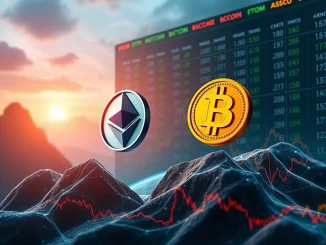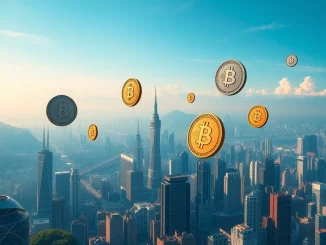
The burgeoning world of Non-Fungible Tokens (NFTs) is navigating uncharted regulatory waters, and leading NFT marketplace OpenSea is stepping up to steer the course. In a bold move, OpenSea has formally requested the Securities and Exchange Commission (SEC) to provide much-needed clarity on how NFT marketplaces should be regulated. This urgent plea highlights the growing pains of a rapidly evolving digital asset class and the critical need for regulatory frameworks to catch up. Are NFTs securities? Are NFT marketplaces exchanges? OpenSea seeks to illuminate these gray areas, advocating for a regulatory landscape that fosters innovation while ensuring compliance.
Decoding the Demand for NFT Regulation Clarity
The core of OpenSea’s argument, as outlined in their letter to SEC Commissioner Hester Peirce, centers on the fundamental nature of NFT marketplaces and their operations. OpenSea contends that current securities laws, particularly the Exchange Act, are not directly applicable to NFT platforms due to the unique characteristics of NFT transactions. Let’s break down OpenSea’s key points:
- Immutable Smart Contracts: Unlike traditional exchanges, NFT marketplaces like OpenSea primarily facilitate transactions through immutable smart contracts. These self-executing contracts automate the buying and selling process, reducing the intermediary role of the platform itself. OpenSea argues this automated process does not align with the Exchange Act’s requirement of “multiple sellers” operating under exchange regulations.
- No Investment Solicitation: OpenSea asserts it does not actively solicit investments in NFTs. The platform provides a venue for creators and collectors to transact, but it does not offer investment advice or actively promote NFTs as investment vehicles.
- Not Acting as User Agents: Crucially, OpenSea emphasizes it does not act as an agent for its users. It provides the technological infrastructure for peer-to-peer transactions but does not take on the traditional roles of brokers or dealers who manage client funds or execute trades on their behalf.
Based on these arguments, OpenSea believes that NFT marketplaces operate outside the traditional definition of exchanges or broker-dealers under existing securities laws. Therefore, they are requesting the SEC to officially clarify that NFT marketplaces should not be classified as such, providing much-needed regulatory certainty to the burgeoning NFT ecosystem.
Why is SEC Clarity on Crypto Regulation So Crucial for NFTs?
The lack of clear crypto regulation surrounding NFTs has created a cloud of uncertainty that hangs over the entire industry. This ambiguity can stifle innovation and hinder growth for several reasons:
- Discourages Institutional Investment: Major institutional investors often require a clear regulatory framework before committing significant capital to a new asset class. Regulatory uncertainty can keep these large players on the sidelines, limiting the potential for market expansion.
- Hinders Innovation and Development: When the rules of the game are unclear, businesses become hesitant to invest in long-term development and innovation. Fear of inadvertently violating regulations can lead to a slowdown in the growth of the NFT space.
- Creates Compliance Challenges: NFT marketplaces and creators are left guessing about which regulations apply to them. This makes compliance complex and costly, particularly for smaller players who may lack the resources to navigate a murky regulatory landscape.
- Potential for Enforcement Actions: Without clear guidelines, there’s a higher risk of unexpected enforcement actions from regulatory bodies like the SEC. This can create a chilling effect on the market and damage the reputation of the NFT industry.
OpenSea’s proactive approach in seeking SEC clarity is therefore not just for their own benefit but for the entire NFT ecosystem. A clear regulatory framework can foster a more stable, predictable, and ultimately, more robust market for NFTs.
OpenSea SEC Investigation: A Precursor to Regulatory Dialogue?
Interestingly, OpenSea’s request for clarification comes shortly after the SEC concluded its investigation into the platform in February. While the details of this investigation remain undisclosed, its closure without any enforcement action could be interpreted as a signal that the SEC is indeed considering the nuances of NFT marketplaces. This prior investigation might have even paved the way for a more constructive dialogue between OpenSea and the SEC regarding NFT regulation.
The fact that the SEC launched and then closed an investigation into OpenSea suggests a level of scrutiny that is now prompting OpenSea to proactively engage and seek definitive guidance. This could be a positive sign, indicating the SEC is moving towards formulating a more concrete stance on NFT regulation rather than simply applying existing securities laws without considering the unique characteristics of this novel asset class.
What’s Next for NFT Marketplaces and Crypto Regulation?
OpenSea’s letter to the SEC is a significant step towards shaping the future of crypto regulation for NFTs. The response from the SEC will be closely watched by the entire crypto community. Several potential outcomes are possible:
| Possible SEC Responses | Potential Impact on NFT Marketplaces |
|---|---|
| Direct Clarification: SEC issues specific guidance stating NFT marketplaces are not exchanges or broker-dealers under current securities laws. | Positive. Provides regulatory certainty, encourages investment and innovation, reduces compliance burdens. |
| No Direct Clarification, Further Study: SEC acknowledges OpenSea’s letter but indicates further study is needed before issuing definitive guidance. | Neutral to Slightly Negative. Uncertainty persists in the short term, but continued dialogue is a positive sign for long-term clarity. |
| Application of Existing Laws: SEC asserts current securities laws already apply to NFT marketplaces, potentially requiring them to register as exchanges or broker-dealers. | Negative. Could significantly increase compliance costs, potentially stifle smaller marketplaces, and limit certain functionalities. |
| New Rulemaking: SEC initiates a rulemaking process to create specific regulations tailored to NFT marketplaces and digital assets. | Potentially Positive (in the long run). While rulemaking takes time, it could result in a more tailored and appropriate regulatory framework for NFTs. |
The path forward remains uncertain, but OpenSea’s move underscores the industry’s desire for a clear and pragmatic regulatory framework. The SEC’s response will be a pivotal moment for the NFT market, potentially shaping its trajectory for years to come.
Conclusion: A Pivotal Moment for NFTs and Crypto Regulation
OpenSea’s urgent plea to the SEC for regulatory clarity is more than just a company seeking guidance; it’s a bellwether for the entire NFT industry. The outcome of this dialogue will have profound implications for the future of NFT marketplaces, creators, and collectors alike. As the digital asset landscape continues to evolve at breakneck speed, the need for thoughtful and adaptable crypto regulation becomes ever more critical. The world watches as the SEC navigates these complex waters, with the hope that their response will foster innovation, protect consumers, and unlock the full potential of the revolutionary world of Non-Fungible Tokens.



